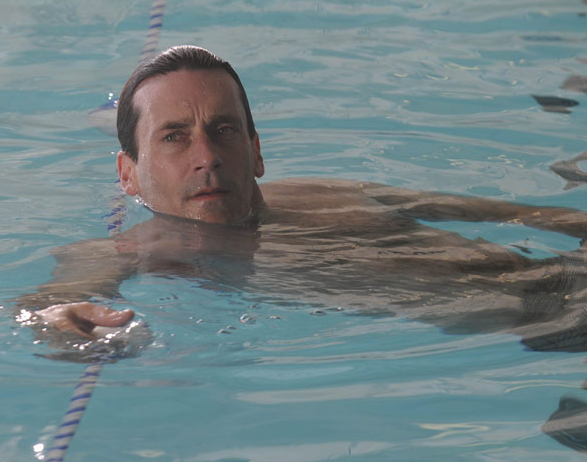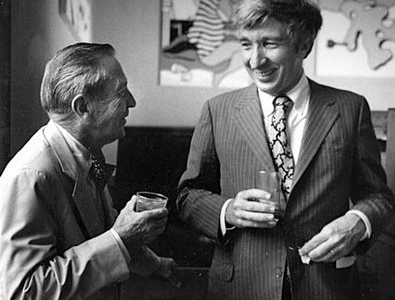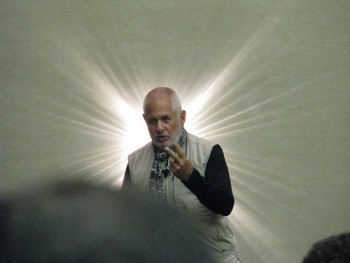Footnotes of Mad Men: The Swimmer
by Natasha Vargas-Cooper

Watching Don Draper emerge from chlorinated baptismal waters, gasping for breath in a cavernous public gym, brings to mind John Cheever’s short story “The Swimmer,” from 1964. “I’ve been a little out of sorts, lately,” Don confesses to his date. Likewise Cheever’s main character, Ned Merrill. Beginning at the public pool, Ned, in an attempt discover Bullet Park’s hidden topography, decides to swim through the private and public schools of his Westchester neighborhood, creating an aquatic trail back to his home. Ned starts the expedition with great hope, as he enjoys the sensation of swimming: “He had been swimming and now he was breathing deeply, stertorously as if he could gulp into his lungs the components of that moment, the heat of the sun, the intenseness of his pleasure.”
Things turn dark when he encounters the drained pool in the backyard of an emptied home of his neighbors. Ned can’t remember where they had gone and feels a creeping despair: “Was his memory failing,” Ned wonders as he plods barefoot through the overgrown lawn, “or had he so disciplined it in the repression of unpleasant facts that he had damaged his sense of the truth?” The more Ned swims, the more comes to light through the comments of his neighbors, some welcoming, others offering pitying condolences for all Ned’s troubles at home. Here emerges a constant Cheever theme and one of the great paradoxes of greater New York: where the separation between city apartment buildings can be as narrow as a pencil, there is great anonymity, whereas in the seclusion of the suburbs, behind fences, we can find ourselves the most exposed.
It’s in suburbia where Don faces his most punishing humiliations, like the remnants of his former life packed into musty boxes, piled on the sidewalk as his ex-wife’s new husband plows the front yard, without a glance or a word as Don loads up his car to return to the city, further asserting the quiet cruelty of Ossining.
Here is the best passage from “The Swimmer” with some nice parallels:
The next pool on his list, the last but two, belonged to his old mistress, Shirley Adams. If he had suffered any injuries at the Biswangers’ they would be cured here. Love-sexual roughhouse in fact-was the supreme elixir, the pain killer, the brightly colored pill that would put the spring back into his step, the joy of life in his heart. They had had an affair last week, last month, last year. He couldn’t remember, It was he who had broken it off, his was the upper hand, and he stepped through the gate of the wall that surrounded her pool with nothing so considered as self-confidence. It seemed in a way to be his pool, as the lover, particularly the illicit lover, enjoys the possessions of his mistress with an authority unknown to holy matrimony. She was there, her hair the color of brass, but her figure, at the edge of the lighted, cerulean water, excited in him no profound memories. It had been, he thought, a lighthearted affair, although she had wept when he broke it off. She seemed confused to see him and he wondered if she was still wounded. Would she, God forbid, weep again?
I won’t spoil the end for you, but like Don about swimming, “you get wrung out.”

“That sad bastard,” is how Francine’s husband, the philanderer, describes Don Draper. The same could be said about Cheever and he would be the first one to tell you that. Like Don, he kept a journal. A collection of his journal entries were eventually published, to much chatter, given that the journals were remarkably dishy (turns out Cheever was a bisexual who thought his daughters chubby and his son a sissy) and soaked in pathos. Cheever was in constant despair about the doubleness of his life; the competing desires for comfort and tradition couple with an impulse to assail the conventions of wealth and family life.
Here’s a passage where he describes his weary frustrations in his latter years while on vacation:
The redness of the marshes makes the blueness of the water seem to be a thrusting force, and the splendor of the landscape is emphatic; but I am an old, old man — and it was so different in my youth — who finds that the bounty and splendor of the world fail to cleanse the thoughts of his heart. My heart is in some motel room, howling at a consummate lewdness.
All this belongs to time that has already passed by Don Draper and his cohorts, though these are concerns of and preoccupations of the Great White Male in literature. David Foster Wallace argued that Cheever, like John Updike, Phillip Roth, Norman Mailer, and Frederick Exley were a league of extraordinary narcissists, whose erudite, philandering, self-pitying protagonists, Wallace claims, were actually stand-ins for the authors. Never attached to any cause, lover, or clan, the individualism of Cheever’s characters, like Ned, may have at one time seemed heroic but are despicable today. They don’t face the great horror: “the prospect of dying without ever having loved something more than yourself.”
Cheever wrote about the stultification of affluence and comfort, his ambition to be recognized as a scribe of his generation and also of humiliating himself at garden parties because he was drunk, cheating on his wife, and disappointing his children. Until he died, John Cheever considered himself lonely.
Previously: Footnotes of Mad Men: The Promethean Woman, or, Our Dog in the Parthenon
You can always find more footnotes by Natasha Vargas-Cooper right here, or, you know, you can get a whole book of ‘em.
Kevin McCarthy, 1914-2010
I can still recall when I first saw the original Invasion of the Body Snatchers on TV as a kid. It terrified me. My abiding memory of actor Kevin McCarthy, who passed away this weekend will be him running down the road at the end of the movie, begging anyone to listen to him. I suspect a number of you will remember him as R.J. Fletcher, Weird Al Yankovic’s nemesis in the 1989 film UHF. Anyway, he was in a ton of stuff, and I was always happy to see his name in the credits. Turns out he was Mary McCarthy’s brother! Who knew? Not me, at least. Anyway, Kevin McCarthy was 96.
26 Songs Heard At The U.S. Open In Order of Their Ability To Pump Up A Professional Athlete
by Reeves Wiedeman

26. “The Price is Right” theme, Sheila Cole
25. “Hava Nagila,” The Jews
24. “Funkytown,” Lipps Inc.
23. “Give It To Me Baby, Rick James
22. “DJ Got Us Falling in Love,” Usher
21. “Philadelphia Freedom,” Elton John
20. “Unwritten,” Natasha Bedingfield
19. “California Gurls,” Katy Perry
18. “Low,” Flo Rida
17. “1901,” Phoenix
16. “I Got You (I Feel Good),” James Brown
15. “Bad Romance,” Lady Gaga (*No. 1 if you’re Rafael Nadal)
14. “Once in a Lifetime,” Talking Heads
13. The Sweet Escape, Gwen Stefani
12. “All These Things That I’ve Done,” The Killers
11. “Morning After Dark,” Timbaland
10. “Dynamite,” Taio Cruz
9. “Yeah!,” Usher
8. “Let’s Get Loud,” Jennifer Lopez
7. “Cobrastyle,” Teddybears
6. “Ready to Start,” Arcade Fire
5. “Empire State of Mind,” Jay-Z
4. “You Shook Me All Night Long,” AC/DC
3. “Gonna Make You Sweat (Everybody Dance Now),” C&C; Music Factory
2. “Stronger,” Kanye West
1. “Blitzkrieg Bop,” Ramones
Reeves Wiedeman is covering the U.S. Open for The Sporting Scene, the sports blog of The New Yorker.
How the 'WSJ' Took a Pro-Corporate Stand on the Nastiest Trademark Battle Ever

This is a brutal attack on the WSJ magazine-over something as seemingly simple as a profile of the fashion importer of Ugg boots. In the piece, the magazine goes “to great lengths to be as friendly as possible to Deckers”-Deckers being the company that shut down every company in Australia that also (and already) made ugg boots, a form of footwear that has existed for ages. Deckers registered the trademark in more than 100 countries and promptly began making their uggs in China. And now the WSJ is here to help you not be taken in by “counterfeit” uggs-so you can only purchase shoes made by the litigation-friendly behemoth.
Your Muffin Top Will Give You Butt Cancer

That gut you’ve got may be adorable and fun to grab hold of, but it’s going to kill you, says Science.
Every extra inch on your waistline raises the odds of bowel cancer even if the rest of your body is trim, doctors have warned. The dangers of a pot belly or ‘muffin top’ were highlighted by a large-scale review of studies into Britain’s second biggest cancer killer. Crucially for the millions battling to contain middle-age spread, it found that you don’t need to be overweight for a generous waistline to cause problems.
Even worse, almost everything that’s fun to eat, “including bacon, ham, pastrami, salami and hot dogs — significantly raises the chances of bowel cancer” (also known as “colorectal cancer” or “cancer of the ass”). Sometimes life is exactly as unrelentingly awful as you expect it to be.
Superchunk, "Digging For Something"
Thanks to the folks at Videogum, you can enjoy this first video from the new Superchunk record, Majesty Shredding. That is correct: new Superchunk record. Sometimes life isn’t as unrelentingly awful as you expect it to be.
Secretive Maybe-Gay Dead Brit Spy May Have Locked Self Into Sports Bag?

The Daily Mail is doing us the service of not letting up on the strange case of Gareth Williams, the MI6 spy found dead in his apartment. First, they provide this graphic of the sports “hold-all” in which his body was found, with this breaking news: “a woman police officer climbed into the holdall in which codebreaker Gareth Williams’ naked body was found, re-enacting the events which it is thought could have led to his death. She managed to zip up the bag and padlock it from the inside.” Well, case closed! More shockingly, the word is that the big gay frame-up-his parents claim he’s straight-actually doesn’t exist? “Police denied claims that gay magazines, bondage gear and the phone numbers of gay escort men were found in the apartment near his body.” Also here is there best stand-alone paragraph: “Erotic asphyxiation is defined as the intentional restriction of oxygen to the brain for sexual arousal.” Oh really.
Newport News

The “narcissism of small differences” began life as a description of the uniquely tedious brand of sectarian infighting that afflicts the intellectual left. Clearly, though, the concept applies with at least equal force to the higher empyrean of our economic order. Consider the recent New York Times Home and Garden dispatch on the lavish Newport spread of Richard Saul Wurman, the high-concept impresario behind the TED (technology, education, design) conference, and his novelist wife, Gloria Nagy. The culture-making pair has been holed up in their 13-bedroom mansion for the past 17 years, but as Times overclass-warren correspondent Penelope Green notes, they fancy themselves to be “in Newport, but not of it.”
Sure, it’s a 19th century copy of a French country estate-a “super mansion,” as Green dubs it, replete with its own historic estate name, “the Orchard,” presumably in partial reference to the verdant eight-acre spread in back. Sure, a pair of Lexuses, one white, one black, are parked in the circular drive out front with the ur-preppy vanity plates “Momsie” and Popsie.” Sure, Nagy once happened upon a smartly dressed middle aged woman and her daughter waiting in the front hall under the mistaken impression that they were awaiting an admissions interview at the Salve Regina University across the street.
But when Wurman hails her into the cavernous interior with the disarming greeting, “Isn’t it pretentious?” Green immediately takes the bait. Wurman may be grinning at his own excess, she writes, but “the joke’s not on him. It’s on his adopted city, its name still associated with the last vestiges of high WASP society.”
And how does that joke work, exactly? As Wurman’s designer confrere Massimo Vignelli explains things, the fusty smart set in Newport “need each other. They need their booze at 5, their costume parties. They need to know who is who, and who married what and how much money. It’s a kind of zoo. In that zoo, of course, Ricky has his own private pavilion, and he never goes out. I think he is considered an alien.”
In reality, of course, American prophets of social mobility have been marveling at the decay of the WASP establishment practically from the moment it first arrived on the Mayflower, not too far from the stately spreads of Newport. So it’s a safe bet that many diehard fixtures of the Newport scene, from to Caroline Astor to Claus von Bülow, haven’t imagined themselves born to those particular manors, either. Long before it became the province of hipsters and (what amounts to the same thing) TV writers, social irony was a diverting plaything of the members of the power elite-and they relished nothing more than the chance to deploy it on their own social backgrounds.
So Wurman’s potshots at the squares in the neighboring mansions come off chiefly as the fine-grained invidious distinction that privileged souls have always used to mark themselves off as proper star-bellied Sneetches. The Rhode Island swells around him are “humorless,” he sniffs, trapped in “an intellectual wasteland.” Why, he confides to Green, “if you asked me to tell you when I last had lunch with anybody but my wife or someone that came to see me from India or New York or Boston or Germany, I couldn’t come up with a name.”
Indeed, as Green notes, one of the perks of establishing the TED series-basically a version of the Burning Man festival for the self-regarding global info-elite, save that admission at Burning Man won’t set you back a cool $6,000-is that you get to hold court among way-new boldfaced names in your 11-fireplace old-money sanctum. During the lunch hours in a recent week, she writes, “a member of the Clinton Foundation came to visit, as did a rear admiral, the dean of a design college, a digital entrepreneur, a German urban planner working in Bangalore and Martha Stewart, who phoned as she was driving through town (Mr. Wurman wasn’t home). ‘I’ve had better lineups,’ he said later.”
You hear that, Newport? Even as powerful an avatar of the good life as Martha Stewart isn’t enough to fill out Wurman’s idea of a decent week’s lunch card. And this is all to say nothing, of course, of the “appealingly eclectic” interior trappings that the couple brought with them from previous tours in L.A. (where they met) and Manhattan. There’s the player-grand piano banging out Baroque chestnuts; there are the Jim Dine, David Hockney and Dale Chihuly artworks. Outside, there’s a modified French formal garden, which Wurman, in a nod to his past career as an architect, has festooned with “contiguous landscapes of circles: there are roses planted in a spiral; a labyrinth of stones; a whorl of Indian columns; a pool shaped like a semicircle. He has collected giant iron submarine buoys that look like planets or land mines and deployed them about the place.” Well, decorative eccentricity, too, has long been a WASP calling card, after all.
And of course, there’s a corps of four fulltime employees to keep the whole grand works functioning and maintained, “including a house manager and the couple’s personal assistant.” And there’s that most treasured elite possession of all: the grown kids that Wurman and Nagy have raised, both from respective earlier marriages and their own union. Tony Wurman is a glass-blower and artist; his brother Joshua, “a severe-weather chaser”; son Reven, a New York photographer; and their daughter Vanessa, who “has developed an equestrian center in Charlestown, R.I.”
These are the very kinds of edifying pursuit, in other words, that any other scion of Newport would train their handsome family legacies and classbound upbringings on. In other words, it turns out that the big joke of the Wurman-Nagy Newport alliance isn’t on the couple themselves, or the self-involved WASP elite surrounding them, but rather on the rest of us. As I’m sure the young Wurman-Nagys learned in some boarding school or another, plus ca change, plus c’est la meme chose.
Chris Lehmann’s book, Rich People Things, which is not at all a collection of these columns, is available now for pre-order! “Social criticism at its scorching-hot best,” says Barbara Ehrenreich!
Photo by dnbkdotcom, from Flickr.
Arianna Huffington, American and American Exceptionalist

Greek-born, London-educated millionaire Arianna Huffington explains America in her new book! “We’ve always been a positive, forward-looking people,” she writes. (“She writes”?) From this short excerpt, published, by what machinations I cannot imagine, on her competitor’s website The Daily Beast, we learn that the first four sections of her book, Third World America, are about how ridiculously terrible things have become for the middle class. (She’s got herself covered on HuffPo though: five items about herself.) Anyway, that is true! Then she makes with the Chevy/Levi’s song and dance. AMERICA USED TO MAKE THINGS. For instance, after Pearl Harbor, we made a hundred aircraft carriers. Let’s do that again! My prescription for America is not dissimilar, to be fair. Would more, and better, jobs improve America? Correct. Okay let’s do that!
